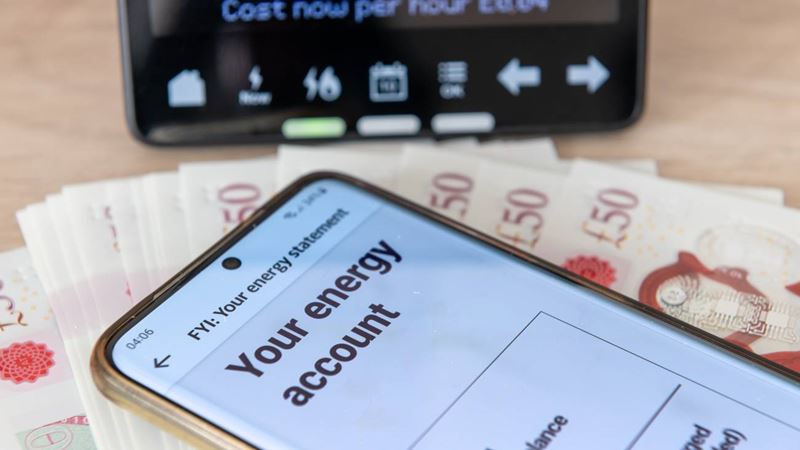

Tens of thousands of people have been overcharged by their energy provider. Here’s how to spot errors on your energy bill, and how to get back the cash you’re owed.

This article is for general guidance only and is not financial or professional advice. Any links are for your own information, and do not constitute any form of recommendation by Saga. You should not solely rely on this information to make any decisions, and consider seeking independent professional advice. All figures and information in this article are correct at the time of publishing, but laws, entitlements, tax treatments and allowances may change in the future.
Energy companies in the UK have paid out more than £20m in compensation to customers they have billed incorrectly over the past five years. That's according to new analysis by The Guardian of complaints handled by the Energy Ombudsman – which steps in when complaints against a provider cannot be resolved.
These figures are a reminder that it’s more important than ever to check your bill and to challenge it if you think there’s been a mistake. Read on to discover more about how to do this.
What’s on this page?
Billing issues are the most common complaints that the Energy Ombudsman deals with. Across all energy providers, billing issues made up 54% of all complaints, followed by smart meters, followed by customer service. 2023 was a record year for complaints, with 122,880 complaints. Complete figures for 2024 are not yet available, but while they look to have fallen in the first nine months of the year, they were still well above pre-pandemic levels. However complaints figures recorded by Citizens Advice – which aren't necessarily the same complaints dealt with by the ombudsman – suggests that 2024 was a record year for energy bill complaints, with 59,773 cases recorded by the service.
>British Gas, which is the UK’s largest energy provider, had the highest rate of complaints to the ombudsman per 100,000 customers of all the major providers. It paid out than a fifth of the £20.4m total compensation paid by the major energy companies.
Elise Melville, energy expert at Uswitch.com, says: “The cost of energy continues to be high, so it’s more important than ever that consumers are not paying more than they should be, and know how to resolve billing errors.” Energy bills do not always make easy reading, but there are a few things to look for.
1. Compare old bills
Martyn James, a consumer rights expert, says: “Find your last two years’ worth of bills online if possible and compare your energy consumption with the previous period. Energy has become more expensive, but this will tell you if the amount you are using has increased suspiciously.”
2. Check ‘estimates’
Look for the ‘E’ or ‘estimated’ on your bill to see if the business is not calculating your bill using actual readings.
Melville says: “If your bill is based on estimated readings instead of actual meter readings, inaccurate charges are more likely. This can lead to customers underpaying – or even overpaying – their energy supplier.”
Submitting regular meter readings can help ensure your bills are more accurate. If you have any trouble reading your meter, then contact your supplier for guidance.
3. Beware ‘back billing’
“Look for ‘back billing’, which is where businesses recalculate your bill based on a new meter reading,” says James.
This is where suppliers send you a ‘catch up’ bill for energy that you have used, but not paid for – for example, if your direct debit has been set too low. Understandably, these can come as an unpleasant surprise for consumers, but they are relatively rare, especially if you submit regular meter readings.
However, the energy regulator Ofgem does impose strict rules on how far suppliers can backdate your bills. “Energy providers cannot recalculate your bill further back than one year if they’ve made errors with readings,” adds James.
This means that if your energy supplier attempts to charge you for energy used over 12 months ago, you are within your rights to refuse to pay. If you have been affected by this, Citizens Advice has a template letter to help you make your complaint.

Billing errors can happen for a variety of reasons. But according to James, some of the most common issues are:
USwitch’s Melville says: “If you’re moving to a new address, make sure to take a reading as soon as you arrive, to ensure you’re paying for what you owe rather than previous occupants’ energy.”
She also points out that new-build flats can be more susceptible to inaccurate meter readings, as the addresses can sometimes get mixed up and don’t match the meters registered on the national database.
“This only happens to a very small number of customers, but if you think there’s been a mix-up then it’s easy to check. Find a recent bill and check the meter number printed there matches the one on your physical meter,” she advises.
Everyone should keep a close eye out for any dramatic increases in their bill, or for sudden changes in the unit rate or standing charges that are unexplained.
The first thing to do is monitor the issue closely yourself, says James: “Check out your bills to see if your energy consumption is showing as increasing, even though you haven’t changed your lifestyle,” he says.
Once you’ve identified an issue, call your energy provider and ask them to look into the problem. They will ask you to take meter readings each day over a one- to two-week period. “If there is a problem they will send an engineer out. But if that doesn’t resolve the problem you can request a new meter,” says James.
If you’re unable to resolve the matter or need further assistance, contact Citizens Advice or the Energy Ombudsman, both of which are free.
You can complain to the Energy Ombudsman if you’ve already complained to your energy company and you’re not happy with their decision, or you’ve not been given a decision within eight weeks. The ombudsman is independent and can ask the supplier to look at your complaint again.
The ombudsman may decide the supplier made the right decision. Or it could force the supplier to give you a response to your complaint if they haven’t already. In some instances, it might tell your supplier to give you financial compensation. If you want to complain to the Energy Ombudsman, you must do so within 12 months of your supplier telling you its decision.


Learn how to spot the telltale signs of financial issues harming your relationship.

Our practical guide covers types of care, costs, CQC ratings, and visiting tips.

Find out the cost and benefits of voluntary NI contributions.

Ghost broker scams, a type of insurance fraud, are on the rise. Find out how to protect yourself.